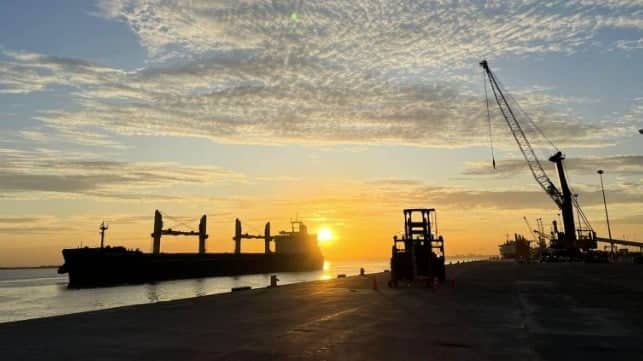Political Turmoil Threatens Mozambique’s Port Investments

The political landscape in Mozambique is increasingly unstable, posing significant risks to the country’s port investments. Since October, post-election violence has escalated, leading to widespread protests and disruptions. These events not only threaten Mozambique’s economic stability but also hinder regional trade in Southern Africa. The Maputo Port operator, Grindrod, has reported severe operational impacts due to ongoing protests, raising concerns about the future of trade and investment in the region.
Impact of Protests on Port Operations
The ongoing protests in Mozambique have had a profound effect on port operations, particularly at the Port of Maputo. As of November 30, the disruptions had delayed 24 vessels, with six others canceling their calls due to stock shortages at the quayside. Grindrod, the operator of the port, stated that the delays could extend into the New Year if the situation does not improve. This is particularly concerning as the end of the year approaches, a critical time for shipping and logistics.
Grindrod has indicated that the fourth quarter has been the hardest hit, especially in terms of cargo volumes at the dry-bulk terminals. The Port of Maputo serves as a vital export gateway for essential minerals like chrome, titanium, and coal. The recent protests forced Grindrod to shut down terminal operations at both Maputo and Matola ports. The situation worsened when South Africa’s border authority closed the Lebombo border point due to escalating violence in Mozambique. This closure disrupted both truck and rail services, further complicating the logistics of transporting goods in and out of the country.
As a direct consequence of these disruptions, the Mozambican government has reported a staggering loss of $54 million. This financial blow highlights the urgent need for stability in the region. Without a resolution to the political turmoil, the future of Mozambique’s port operations—and by extension, its economy—remains uncertain.
Broader Implications for Regional Trade and Security
The political instability in Mozambique has broader implications beyond its borders. The country has been recognized for its potential wealth, particularly following the discovery of large natural gas reserves. Over the past decade, Mozambique has attracted more than $60 billion in investments from major global energy companies like Total, Exxon Mobil, ENI, and China National Petroleum Corporation (CNPC). However, the rise of an Islamist insurgency in northern Mozambique has jeopardized these energy projects, leading to significant delays and halts in operations.
In 2020, the situation escalated when Islamic State-linked fighters captured the port of Mocimboa da Praia, a crucial commercial seaport for contractors in the offshore gas sector. The lack of effective governance in Maputo has exacerbated the risks in the northern provinces, where insurgency activities are prevalent. This instability not only threatens large-scale energy projects but also raises concerns about maritime security in the region.
Moreover, the Mozambique Channel has emerged as a critical shipping route, especially as global traffic reroutes from the Suez Canal. This channel is not only a vital passage for international trade but also a hydrocarbon hub, particularly in the Rovuma Basin, which holds over 100 trillion cubic feet of recoverable natural gas. Ensuring stable governance in Mozambique is essential to prevent the political challenges from evolving into a regional maritime security issue. The stakes are high, and the need for a resolution has never been more urgent.
